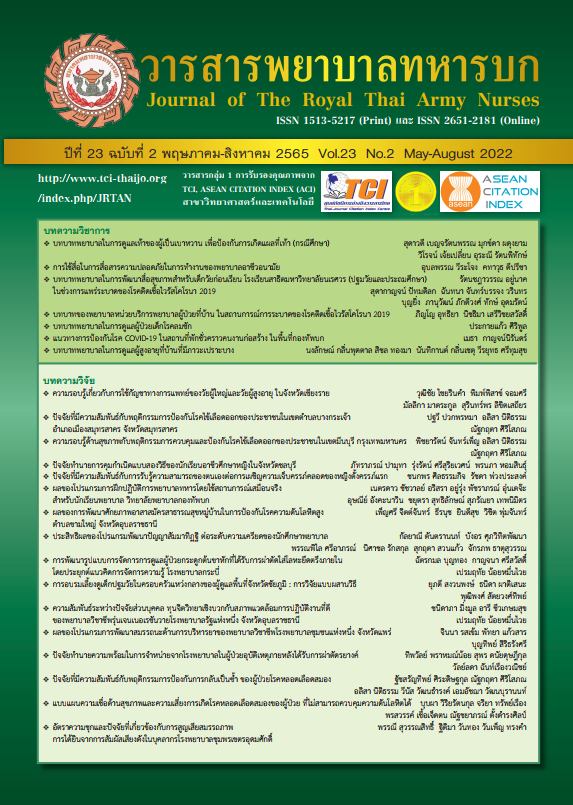Effects of the Care Training Program on Application Skills of Caregivers of Older Adults Stroke Survivors in Communities and Clinical Outcomes
Keywords:
the Care Training Program, Application Skills, Caregivers of Older Adults Stroke Survivors, Clinical OutcomesAbstract
This quasi-experimental research aimed to test effects of the care training program on application skills of caregivers of older adults stroke survivors in communities and clinical outcomes. Samples were sixty caregivers of older adult stroke survivors living in Wiangchai district, Chiangrai.Those samples with purposive sampling were equally divided into an experimental and a control group. The experimental group received 8 weeks care training program, while the control group was not getting any treatment. Application skills and clinical outcomes were measured at 4-weeks after the intervention completion. Research instruments were 1) experimental tools: the care training program included the manual of cerebrovascular disease in older adults and the caring, lesson plan, and VDO. 2) collection tools: demographic data, measure tool for the ability of care, and procedural skills practice. All tools were tested for the validity from five experts; CVI = 1. Additionally, the assessment tool was tested for reliability; KR 20 =.812. Dependent t-test was for the mean difference testing of the application skills score, and number of complications after the experiment between two groups. Furthermore, Chi-square test was for the difference of numbers of samples with each level of pressure sores. Findings: Application skills of the experimental group were significantly higher than control group (p<.001). The Incidence of falls in experimental group was lower than the control group (p<.05). No significant difference of pressure sore between two groups (p <.213). Results of this study could be applied for daily care plan of older adults stroke survivors in communities.
Downloads
References
Ministry of Health, Department of Disease Control. Bureau of Non-communicable Diseases Morbidity. Annual report 2017. 1st ed. Nonthaburi: Ministry of Health; 2017. (In Thai).
Jett KF. Neurological disorders. In Touhy TA, Jett KF. (Editors.), Ebersole and Hess’: Gerontological nursing & health ageing. 5thed. St. Louis: Elsevier Mosby; 2018. p.92-109.
Jordan JE, Buchbinder R, Osborne RH. Conceptualising health literacy from the patient perspective. Patient Education and Counseling 2010;79:36-42. doi.10.1016/j.pec. 2009.10.001
Nutbeam D. Defining, measuring and improving health literacy. Health Evaluation and Promotion 2015;42:16-21.
Pindus DM, Mullis R, Lim L, Wellwood I, Rundell AV, Aziz NAB, Mant J. Stroke survivors’ and informal caregivers’ experience of primary care and community healthcare services-a systematic review and meta- ethnography. PLOS 2018:1-23. doi.org/10.1371/journal.pone. 0192533
Wimolphan P, Pidchalard K, Panya P, Jitaueangkul P. Health Conditions and Care Needs in the Dependent Community-dwelling Elderly in Thailand. Chiangrai: Mae Fah Luang University; 2019. (In Thai).
Junsree V, liangchawengwong S, Muengtaweepongsa S.The Effects of a Family ManagementEnhancing Program on The Caregivers’skill of An Early Mobility of Stroke Patients. Journal of The Royal Thai Army Nurses. 2020;21(3):411- 420. (in Thai).
Pitthayapong S, Thiangtam W, Powwattana A, Leelacharas S, Waters CM. A Community Based Program for Family Caregivers for Post Stroke Survivors in Thailand. Asian Nursing Research. 2017;11(2):150-157.
Somdet Prayannasungworn Hospital. Annual statistics of Somdet Prayannasungworn Hospital. Chiangrai: Somdet Prayannasungworn Hospital; 2018. (in Thai).
Wimolphan P, Pidchalard K, Panya P, Jitaueangkul P. Development of the Care Plan for Caregivers of Communities Dwelling Older Adult Stroke Survivors. Journal of The Royal Thai Army Nurses. 2019;20(3):237-46. (in Thai).
Godfrey CM, Harrison MB. Systematic review resource package: the Joanna Briggs Institute method for systematic review research quick reference guide. Kingston: Queen’s university; 2015.
Ventegodt, S, Merrick, J., & Andersen, NJ. Quality of Life Theory I. The IQOL Theory: An Integrative Theory of the Global Quality of life Concept. The Scientific World Journal. 2003 Oct; 3:1030-1040. doi: 10.1100/tsw.2003.82
Whitehead AL, Julious SA, Cooper CL, Campbell MJ. Estimating the sample size for a pilot randomised trial to minimise the overall trial sample size for the external pilot and main trial for a continuous outcome variable. Statistical Methods in Medical Research 2016;25:1057-73. doi: 10.1177/ 0962280215588241
Ministry of Health, Medical department. Manual of screening/older adults assessment. Bangkok: Veterans Organization; 2015. (In Thai).
Denissen S, Staring W, Kunkel D, Pickering RM, Lennon S, Geurts ACH, Weerdesteyn V, et al. Interventions for preventing falls in people after stroke. Stroke;51(3): e47–e4.
Downloads
Published
How to Cite
Issue
Section
License
Copyright (c) 2022 Journal of The Royal Thai Army Nurses

This work is licensed under a Creative Commons Attribution-NonCommercial-NoDerivatives 4.0 International License.
บทความหรือข้อคิดเห็นใดใดที่ปรากฏในวารสารพยาบาลทหารบกเป็นวรรณกรรมของผู้เขียน ซึ่งบรรณาธิการหรือสมาคมพยาบาลทหารบก ไม่จำเป็นต้องเห็นด้วย
บทความที่ได้รับการตีพิมพ์เป็นลิขสิทธิ์ของวารสารพยาบาลทหารบก
The ideas and opinions expressed in the Journal of The Royal Thai Army Nurses are those of the authors and not necessarily those
of the editor or Royal Thai Army Nurses Association.






